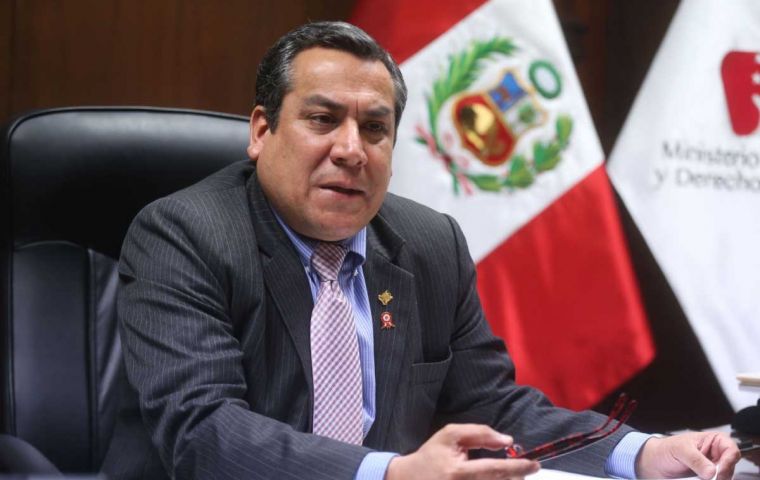MercoPress. South Atlantic News Agency
Adrianzén Olaya sworn in as Peru's new Prime Minister
 Adrianzén Olaya resigned as Justice Minister in 2015 to avoid impeachment
Adrianzén Olaya resigned as Justice Minister in 2015 to avoid impeachment Gustavo Lino Adrianzén Olaya was sworn in Wednesday as Peru's new Prime Minister (technically chairman of the Council of Ministers) following Alberto Otárola Peñaranda's resignation on Tuesday amid an influence-peddling scandal involving the hiring of a woman he called “my love” at the Defense Ministry.
Adrianzén Olaya, 57, served as Minister of Justice and Human Rights in 2015 under then-President Ollanta Humala. In 2023, he was named Peru's permanent representative before the Organization of American States (OAS).
A law graduate from the University of Lima who also studied at Madrid's University of Alcalá de Henares, he majored in Human Rights in Geneva (Switzerland), Strasbourg (France), San José (Costa Rica), and Florence (Italy). He also has a master's degree in Public Administration and Management from Madrid's INAP and a Diploma in Public Administration from the Complutense University, also in the Spanish capital.
In 2015, then Money Laundering Prosecutor Julia Príncipe claimed that Adrianzén tried to “gag” her by asking for explanations for her statements to the press regarding the investigations involving First Lady Nadine Heredia. Adrianzén was summoned to Congress to account for these allegations but resigned to avoid impeachment. Príncipe was also relieved of her position.
Also Wednesday, Peru's one-house Congress approved with 91 votes in favor, 30 against, and one abstention the return to a bicameral system with no ban on back-to-back mandates. These reforms were rejected by 90% of the population in a referendum in 2018. Peru's Congress had tried to pass this initiative back in November but failed to achieve the minimum 87 votes then.
Now a new Senate will have 60 seats for five-year terms while there will be no hindrance to consecutive terms in Congress for Deputies sitting on the 130-member Lower House.
The Executive has no veto power in cases of Constitutional legislation and must enact it regardless of the head of state's stance. Wednesday's measures mean 74 modifications to 56 articles of the Peruvian Constitution.
A survey last February by the Institute of Peruvian Studies (IEP) showed that Congress had a rejection rate of 90% while President Dina Boluarte's disapproval stood at 77%.




Top Comments
Disclaimer & comment rulesCommenting for this story is now closed.
If you have a Facebook account, become a fan and comment on our Facebook Page!